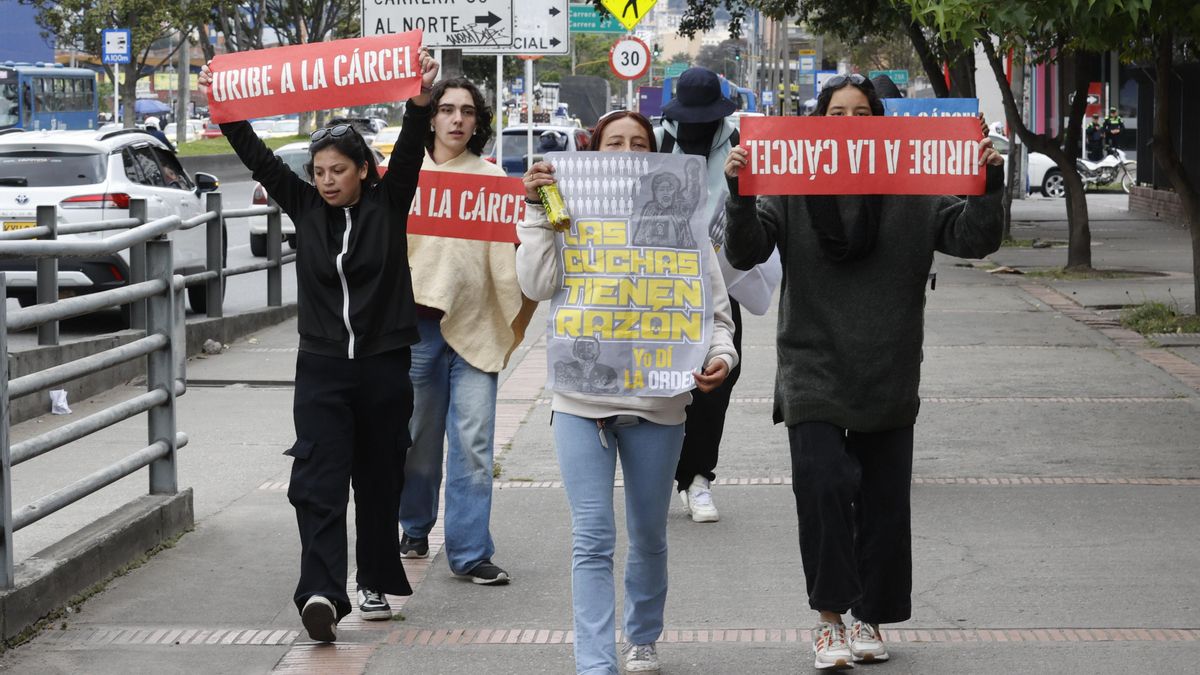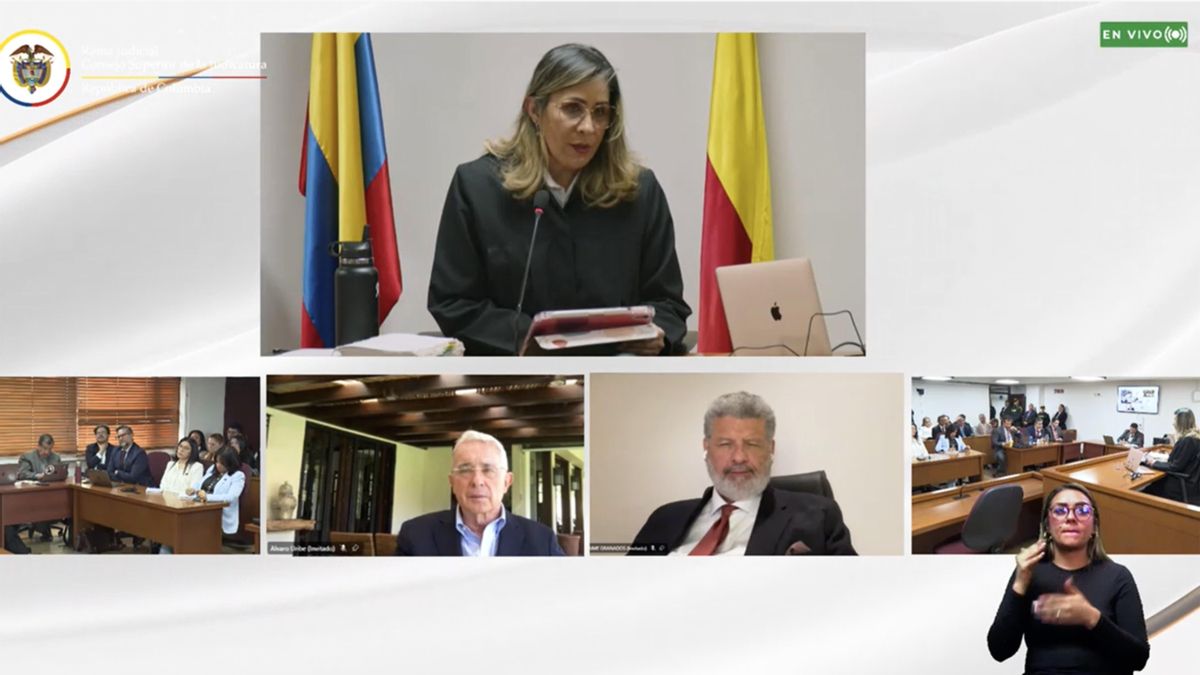The Justice of Colombia has declared guilty to the former president of the country, Álvaro Uribe, in the first instance for the crimes of bribery in criminal action and procedural fraud. Uribe has thus become the first ex -president convicted in Colombia in which it has been the most media case that the country has faced. The ex -president, who has been acquitted from the crime of simple bribery, faces a possible penalty of between four and eight years in jail, still to rule.
The condemnatory ruling against Uribe, 73 and founder of the right -wing party Democratic Center, was read by Judge 44 Criminal of the Circuit of Bogotá, Sandra Heredia, in an audience of more than ten hours and that monopolized the country's attention in television channels and social networks. The former president has announced that he will appeal the ruling before the Superior Court of Bogotá and “if necessary, will go to the Criminal Cassation Chamber of the Supreme Court of Justice”, indicating that the final resolution of the case can be extended even years.
Uribe, who ruled Colombia between 2002 and 2010 and was consolidated as the most powerful political leader in decades, has virtually attended the audience, which began at 8:30 local time (15:30 Spanish time) this Monday and was broadcast live.
“It forces this instance to announce against Mr. Álvaro Uribe Vélez a sense of the judgment of conviction for punishable behaviors in criminal action, in a homogeneous contest three times and in heterogeneous competition in relation to procedural fraud,” Judge Sandra Heredia said when reading the ruling against the 73 -year -old president.

Regarding the reading of the sentence against Uribe, which was set for next Friday, August 1, the judge said the law provides for the crimes for which it was convicted “an amount exceeding four years and less than eight.”
However, he clarified that the defendant, “indistinctly of the penalty that will be imposed, is worthy of house prison as a substitute for the prison sentence.”
When commenting on the ruling, the prosecutor of the case, Marlenne Orjuela, requested a greater penalty of 108 months in prison (nine years) and a fine of 1,025 legal minimum wages in force, equivalent to 1,458 million Colombian pesos (about 349,000 dollars). Against this condemnation, the appeal, which the defense must present within a maximum period of five days, counted from the reading of the sentence, before the Superior Court of Bogotá.
A 2012 case
The process dates back to 2012, when Uribe sued the left senator Iván Cepeda for alleged witness manipulation. At that time, Cepeda prepared a complaint against the former president for alleged links with paramilitarism. However, despite what Uribe expected, the Supreme Court did not open an investigation against Cepeda, but initiated a process against him for alleged bribery and for which he already fulfilled a home arrest warrant for 67 days in 2020.
The plaintiffs claim that Uribe, through the lawyer Diego Cadena, tried to bribe witnesses in prisons, such as the exparamilitary Juan Guillermo Monsalve, so that they did not declare against him or mention possible links of his with paramilitarism, within the framework of the dispute with Cepeda. The reading of the ruling has taken place in the presence of the senator, accredited as a victim, and his lawyers.
Supporters and critics of the former president have gathered on the outskirts of the Judicial Complex of Paloquemao, where the court is, to wait for the conclusions of the ruling. Uribe's supporters, who launch harangues in favor of the former president, have had a confrontation with opponents of the politician, forced the police to intervene to calm the spirits.
The judge validates two important evidence
During the reading of the ruling, the judge has validated the interceptions to the ex -president's telephone and the recordings with a spy clock, which her defense had asked to be rejected by illegal.
One of the evidence presented at the trial against Uribe has to do with an interception of his telephone ordered in 2018 by the Supreme Court. In intercepted conversations for several days, Uribe speaks with chain, one of his lawyers. “It cannot be affirmed that in the execution of the investigation act there has been an action of bad faith, an intentional irregularity arranged in meetings with the purpose of intercepting Mr. Uribe Vélez in the framework of a different process. Such statements correspond to conjectures and assumptions raised by the defense without support in the evidence,” said the judge.
Uribe's defense has argued that these interceptions were illegal because Judge José Luis Barceló asked the Prosecutor's Office as part of another process, outside the former president, and ensures that the content of the conversations must be protected by the professional secrecy between a lawyer and his client.
The other evidence against Uribe validated by the judge is the use of a spy clock used by the Monsalve exparamilitary to record the visits he made to the Bogota prison of La Pillota the lawyer's lawyer. The objective of these visits was supposedly to offer him help in exchange for not declaring Uribe for his possible links with paramilitarism, in the dispute he maintained with Senator Cepeda.
The clock was given to Monsalve by his partner of the time, Deyanira Gómez, in order to secretly record the conversations with chain, something considered illegal for the defense, but the judge pointed out that the fact of hiding that information to the interlocutor “should not be understood as an undue or criminal action.”
“The probative debate does not fall exclusively on the magnetophonic recordings close to trial, however, the legality of these was verified, elucidating the aspects related to obtaining for which they did not go to them by illegal methods (…) These video recordings were not obtained either violating the right to privacy or performed in bad faith,” said Heredia.
“Justice does not kneel against power”
Heredia has assured Monday that justice “does not kneel against power” at the beginning of reading of the ruling. The judge has defended the judicial autonomy of her office in the face of what she has described as “one of the most significant cases in its recent judicial history” that, he says, “has aroused passions, divided opinions and mobilized emotions.”
“The law cannot tremble in front of noise and justice does not kneel before power. Justice as (the Greek goddess) theme does not see names, positions, or statures because her gaze is focused exclusively on the legal truth and the ethical duty to resolve according to law and consciousness,” said Heredia.

In that line, he has reiterated that this “is not a trial against Colombia's political history, it is not a rematch, it is not a conspiracy, it is not an act of opposition or politics, it is an act of justice and only justice.” He stressed that his decision “does not decide on a name but about facts” and that he took it “without passion, without resentment and without fear”, after 475 days of a “marathon fight against the clock.”
“There is no place for suspicion or electoral calculation. Neither for interested readings,” added Heredia, who has also defended procedural guarantees, respect for due process and the presumption of innocence during this trial despite the “delegitimation attempts and attacks that the judiciary has received.”
In that sense, the judge recalled that this process “has been in charge of women, who since their roles in each of the stages of the process has faced even macho attacks and questions that would not have been formulated perhaps if who decided to be a man.” “The toga has no gender, but character,” said Heredia, who has ended his introduction by citing the father of the theory of powers, Montesquieu: “The law must be like death, which does not exceed anyone.”
USA and the Latin American right lament the ruling
The Colombian president, Gustavo Petro, requested on Monday to respect the judicial ruling and defended judicial independence by stating that his government “does not pursue anyone for political reasons.” “Sympathizers or not of former President Uribe must respect that justice. The rest is bestiality. And Colombia must be wise,” Petro wrote in X.
The leftist president added that his government “does not pursue anyone for political, sexual, gender or religious reasons, does not press justice that is completely independent,” and stressed: “Any mention to the contrary of foreign authorities is nothing but an outrage that we do not allow.”
However, the ruling has not liked the Colombian, Venezuelan and US right right. The former Colombian presidents Iván Duque and Andrés Pastrana, like other politicians, expressed on Monday their support for former president Álvaro Uribe. “Álvaro Uribe Vélez is not alone. We are millions of Colombians who have seen their innocence proven throughout this process full of irregularities and infamies,” he wrote in X Duke (2018-2022), whose political mentor was Uribe.
The Venezuelan opposition leader María Corina Machado, on the other hand, sympathized with the former Colombian president Álvaro Uribe in “these hard and complex hours she is facing.” “I send all my solidarity, trust and affection,” said the former deputy in a message in the social network X in which she labeled Uribe, who, in addition, was acquitted of the crime of simple bribery in the considered 'trial of the century' in Colombia and faces a possible penalty of between four and eight years in jail.
Machado said that the ex -president of the Andean country “has been a genuine ally of democracy and freedom in Venezuela, always assuming fate” of both “nations is twinned.” “There will be no peace in Colombia without freedom in Venezuela, and we need the Colombian people to succeed in our struggle. I know that true justice will be imposed in their country and ours. Much strength!” Added the opponent.
To these criticisms of the sentence has joined the US. The Secretary of State, Marco Rubio, and several congressmen have condemned the ruling. “The only crime of the Colombian president Uribe has been to fight tirelessly and defend his homeland,” said Rubio in the Social Network X. The Secretary of State also denounced that the ruling of Judge Sandra Heredia is due to the fact that justice in Colombia is politicized. “The instrumentalization of the Colombian Judiciary by radical judges has laid a worrying precedent.”





